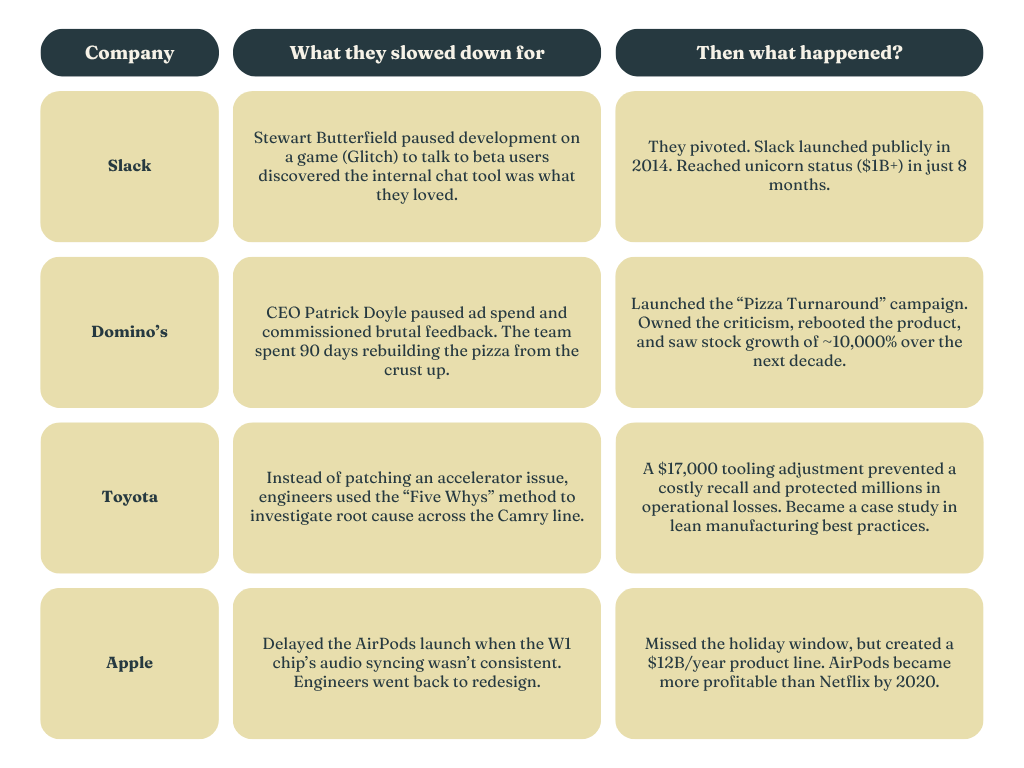Where the "Fast Is Best" Belief Comes From
The Pattern Started a loooong time ago.
The preference for speed is woven into our industrial history, economic systems, and moral values.
🏭 Industrial Revolution Output per hour = value. Time is money. Slowness = waste.
🇺🇸 Capitalism Scale, and efficiency are virtues. Faster = more profitable.
🧠 Western Individualism Self-worth is tied to productivity. Busyness is a status symbol.
📱 Tech & Social Media Instant response = engagement. Fast cycles = survival.
Over time, speed became moralized.
And humans? We're wired to repeat what works. When fast gets rewarded—money, praise, quick wins—your brain starts to favor it.
Fast starts feeling not just productive but correct. Over time, it doesn't feel like a choice.
The Pressure to Stay Moving
We live in a world that rewards motion.
We see it all the time.
Fast people were seen as hard-working, productive, and decisive.
"Wow, you're so quick."
"You got that done already?"
"You're so fast!"
We treat speed like a compliment.
So, we collectively keep pushing.
Keep sprinting.
Keep reacting.
Because slowing down?
That feels risky.
It feels like falling behind.
But Here's the Part We Skip
Speed isn't bad.
You should move fast sometimes.
→ Launch before you're totally ready
→ Say yes to that dream opportunity and learn as you go
→ Try things before you have an idea if it'll work
But the people who pull this off?
They've done enough of the right type of thinking beforehand, so when they move fast, it works.
The “Draft-and-Don’t-Send” Moment
You've been there: a Slack ping or text lights up your phone.
You read this note, and suddenly, your breath quickens, your pupils dilate, and your jaw clenches.
Your thumbs fly.
The comeback is spicy AF🔥.
All you have to do is tap Send.
But instead, you breathe, leave the draft open, and walk away from it for a few minutes.
When you return, you spot the extra jab, trim the rant, and hit send.
That tiny pause is doing heavy cognitive lifting 🧠:
1. Prefrontal cortex activation → Better decisions
When you pause, your dorsolateral prefrontal cortex lights up. This part of your brain handles long-term planning, trade-offs, and abstract reasoning. (Koban et al., 2021 · McClure et al., 2004)
“Do I want to show this person I’m losing my sh!t with this response?”
2. Reflection increases execution efficiency
People who reflect before acting are better at identifying leverage points, according to research from Harvard Business School. (Di Stefano, Gino, Pisano, 2014)
In a 2014 study, employees who spent 15 minutes reflecting at the end of each day performed 23% better on future tasks than those who didn't.
Why?
Because slowing down helps your brain spot what worked—and what didn't—so you're not stuck repeating the same avoidable mess.
“Do I want to clean this up later?”
3. Pausing reduces emotional distortion
When you react quickly, your brain fills in the blanks based on emotion—not reality. Research shows that high arousal narrows your focus and increases negative interpretation bias. (Ochsner & Gross, 2005 · Barrett et al., 2007)
That means you're more likely to assume tone, read into what wasn't said, and overcorrect in your response.
Slowing down helps clear that filter.
You can see what was said, not just what your stress was screaming.
So, instead of sending a PhD dissertation that proves your point, you write short, direct sentences that you don't have to walk back to later.
“Am I reacting to what they said or what I felt?”
So what does this have to do with business?
Everything.
Because the same brain that almost sent that unhinged Slack message makes your product, hiring, and strategy decisions, too.
And if you don't build the muscle to pause on the small stuff, you'll default to speed on the big stuff. See the next section for some examples.
Slow-Mo Receipts
Before you roll your eyes and think, "Cool, but I'm not Apple,"—hang on.
Every one of those slow-downs happened because someone hit pause.
Somewhere in the middle of all that process and pressure, a person went: "Hold up!"
And instead of charging ahead, they stopped to make sense of what was going on.
That kind of discernment?
Becoming increasingly important.
While tech accelerates and automation and AI get faster, our cognitive defaults (e.g., short-term thinking, impulsivity) don't auto-upgrade.
Human brains and nervous systems have largely unchanged in structure over the last 40,000–100,000 years.
So, what's the most valuable skill you can learn no matter how fast industries change?
Understanding humans. Starting first with your brain.
And if that sounds too soft, here's the hard truth:
Most avoidable mistakes in business aren't from bad ideas. They're from rushed ones.
Speed might get you there faster.
But only discernment makes sure you're headed somewhere worth going.
Pause better.
Decide smarter.
Sources
Barrett, L. F., Mesquita, B., & Gendron, M. (2007). Context in emotion perception. Current Directions in Psychological Science, 16(5), 286–290.
DeFelipe, J. (2011). The evolution of the brain, the human nature of cortical circuits, and intellectual creativity. Frontiers in Neuroanatomy, 5, 29.
Di Stefano, G., Gino, F., Pisano, G. (2014). Making experience count: The role of reflection in individual learning. Harvard Business School Working Paper Series, No. 14-093.
Koban, L., Schneider, R., Ashar, Y. K., Andrews-Hanna, J. R., Landy, L. N., & Wager, T. D. (2021). Brain networks of social emotions: A meta-analysis of fMRI studies. Social Cognitive and Affective Neuroscience, 16(8), 814–833.
McClure, S. M., Laibson, D., Loewenstein, G., & Cohen, J. D. (2004). Separate neural systems value immediate and delayed monetary rewards. Science, 306(5695), 503–507.
Ochsner, K. N., & Gross, J. J. (2005). The cognitive control of emotion. Trends in Cognitive Sciences, 9(5), 242–249.
Swart, T. (2019). The Source: The secrets of the universe, the science of the brain. Vermilion.

